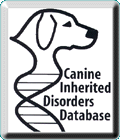
Immunoproliferative (Basenji) enteropathy/lymphocytic-plasmacytic enteritis
Inflammatory bowel disease is a common cause of chronic diarrhea and vomiting in the dog. The lining of the stomach or small or large intestine becomes infiltrated with inflammatory cells, and this interferes with the normal functions of digestion and absorption. This immune-related inflammation may be a response to parasites, bacterial infection, dietary sensitivities, or intestinal cancer, but in most cases, no obvious cause is found.
In the Basenji, a hereditary lymphocytic-plasmacytic enteritis has been identified, called immunoproliferative enteropathy, which causes severe intestinal malabsorption and loss of protein (protein-losing enteropathy).
unknown.
This condition is usually first seen in young adult (to middle-aged) Basenjis. There are intermittent bouts of severe diarrhea which may be preceded by loss of appetite, and may be associated with stressful events such as boarding, travel, or vaccination. Weight loss is common, due to loss of protein and other nutrients from the gut. Without treatment, the conditon becomes progressively worse leading to emaciation.
There are many disorders that cause intermittent diarrhea in dogs, so diagnosis is not simple. Your veterinarian will do blood and fecal tests for parasites, bacterial infections and other causes of diarrhea. An intestinal biopsy is necessary for a definitive diagnosis of this condition. This involves surgical removal of small samples of your dog's intestinal wall for examination by a veterinary pathologist.
There is no cure for this condition, but it can often be controlled if treatment is started early. Dietary management is important, using a special intestinal diet with a good quality protein source and without additives. Because it is the hyperactive immune response that leads to tissue damage and interferes with normal intestinal function, treatment is aimed at suppressing that response and decreasing the inflammation present in the gastrointestinal tract. Corticosteroids (prednisone) are used for this purpose, starting at a relatively high dose. Usually your dog's condition will begin to improve in 1 or 2 weeks and after 1 or 2 months, your veterinarian will begin to gradually reduce the dose to alternate day therapy.
Side effects of corticosteroid treatment include an increase in drinking and appetite, and weight gain. These are less of a problem at low doses. There are other immunosuppressive drugs that may be used in combination with corticosteroids, if the response to the latter is unsatisfactory or the side effects are unacceptable.
Hypergammaglobulinemia is seen with this condition. Endoscopy may reveal normal- or abnormal-looking GI mucosa. A full-thickness biopsy (surgical or by endoscopy) is essential for definitive diagnosis.
Since the primary treatment for inflammatory bowel disease is immunosuppression, it is imperative to rule out possible infectious causes of GI disease such as Giardia, Salmonella, histoplasmosis, intestinal bacterial overgrowth, etc.
Affected dogs should not be bred and, until more is known about the mode of inheritance, it is preferable to avoid breeding their parents and siblings as well.
FOR MORE INFORMATION ABOUT THIS DISORDER, PLEASE SEE YOUR VETERINARIAN.
Burrows, C.F., Batt, R.M., Sherding, R.G. 1995. Diseases of the small intestine. In E.J. Ettinger and E.C. Feldman (eds.) Textbook of Veterinary Internal Medicine, pp. 1169-1232. W.B. Saunders Co., Toronto.
Ackerman, L. 1999. The Genetic Connection: A Guide to Health Problems in Purebred Dogs. p. 77. AAHA Press, Lakewood, Colorado.
- (Disorder) related terms:
- Disorder Type:

